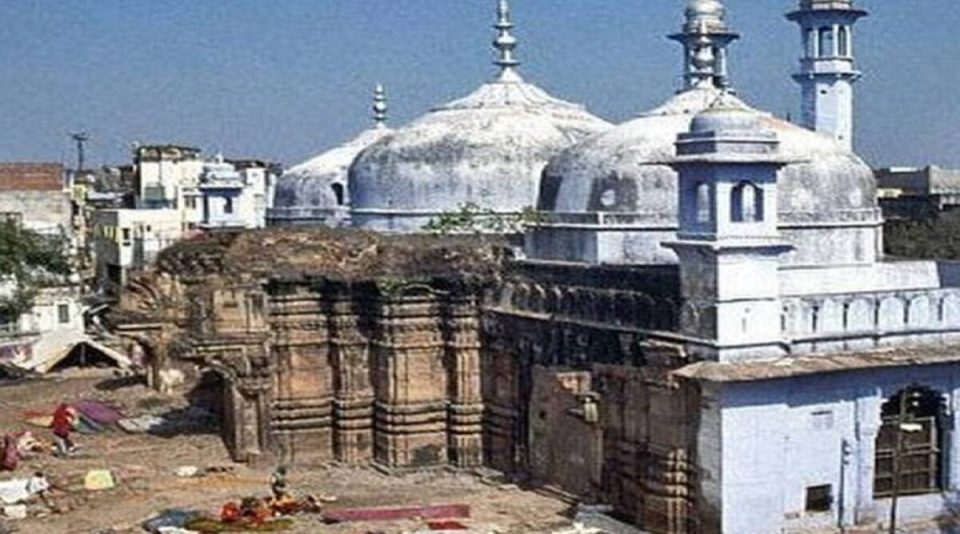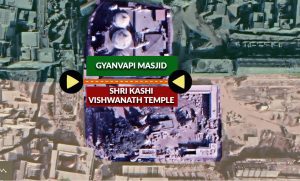
Explained: The legal tangle over Varanasi's Gyanvapi mosque
A legal battle has ensued over a Varanasi court’s order to conduct day-to-day survey of the mosque to inspect, conduct videography and collect evidence on the alleged existence of Hindu idols on the mosque premises which is adjacent to the Kashi Viswanath temple

The Gyanvapi mosque in Varanasi is in the news again, decades after Hindu groups demanded ownership of the mosque land, claiming it was built on the remains of a Shiva temple.
This time, a legal battle has ensued over a Varanasi court’s order to conduct day-to-day survey of the mosque to inspect, conduct videography and collect evidence on the alleged existence of Hindu idols on the mosque premises.
History of Kashi Viswanath-Gyanvapi complex
The 17th century mosque shares a boundary with the 18th century Kashi Viswanath Temple and together the campus is referred to as the Kashi Viswanath-Gyanvapi complex.
 The mosque, located to the left of the Kashi Viswanath temple, is said to have been constructed in 1669 on the orders of Mughal ruler Aurangzeb. A temple of Lord Shiva called Vishweshar temple is said to have been demolished for this.
The mosque, located to the left of the Kashi Viswanath temple, is said to have been constructed in 1669 on the orders of Mughal ruler Aurangzeb. A temple of Lord Shiva called Vishweshar temple is said to have been demolished for this.
Also read: Court orders resumption of video inspection inside Gyanvapi mosque
Historians say the current structure of the Kashi Viswanath temple was built on the adjacent side of the mosque in 1780 by Maratha ruler Ahilyabai Holkar of Indore. They say the Vishweshar temple had suffered repeated demolitions by Muslim invaders including Mohammad Ghori and Sikandar Lodi between 1194 AD and 1669 AD, but parts of its western wall on the Gyanvapi mosque testify its existence and antiquity.
What prompted the Varanasi court’s survey order?
The court of civil judge (senior division) Ravi Kumar Diwakar gave its order for survey and videography of the mosque premises after hearing petitions filed by five Hindu women.
In their petitions, filed on April 8, 2021, the women – Rakhi Singh, Manju Vyas, Sita Sahu, Lakshmi Devi and Rekha Patha – all members of Vishwa Vaidik Sanatan Sangh, had requested the court to allow the year-long worship of the idols of Maa Shringar Gauri, Lord Ganesha, Lord Hanuman and Nandi at the shrine located behind the western wall of the mosque complex. The petitioners had also appealed to the court to allow them to worship other “visible and invisible deities within the old temple complex”.
The shrine at present is only opened for worship once a year. Locals have told the media that while there was no bar on the entry of people from other religions to the mosque before 1992, Hindus were barred from entering the campus as part of a new security plan effected after the 1992 Babri Masjid demolition.
The court had ordered an Archeological Survey of India-helmed survey to be conducted on the mosque premises and had appointed an advocate as a court commissioner for the survey.
The mosque managing committee challenged the lower court’s order in the Allahabad High Court on April 12 this year, but the petition was dismissed on April 22.
Mosque committee protests survey
A crowd backed by the Anjuman Intezamia Masjid Committee, the managing body of the mosque, had prevented a court appointed-team led by advocate commissioner Ajay Kumar from entering the masjid premises and a barricaded area inside it when the latter arrived for the survey on May 6-7.
Reports said while the survey is meant to ascertain if the mosque was superimposed on the foundations of a temple, the mosque committee has been adamant about not allowing anyone to enter its premises and says the survey should be limited to the outer wall of the mosque premises.
The committee moved court on May 7, accusing the commissioner of being biased and seeking his replacement. The committee also pleaded that only certain parts of the precincts be covered in the survey.
Also read: Amid protests, survey begins at Gyanvapi mosque next to Kashi temple
The Varanasi court, on May 12, dismissed the committee request and said the survey inside the mosque will continue. The court, however, asked the survey team to furnish the report by May 17. It also added two advocates – Vishal Singh and Ajay Pratap Singh – to the survey commission.
SC refuses to maintain status quo
Delivering a further blow to the mosque management, the Supreme Court on Friday (May 13) declined to stop the survey ordered by the Varanasi court, stating that it will take a call only after perusing the case.
Senior advocate Huzefa Ahmadi, representing the mosque committee, had requested a status quo in the case.
“A survey has been directed in relation to the Varanasi property. This is covered under the Place to Worship Act. Now, the court has ordered a court commissioner to conduct a survey. This has been a mosque since time immemorial,” Ahmadi said in the petition.
Not the first title dispute
This is not the first time a dispute has erupted over the ownership of the complex.
In 1936, three Muslim petitioners had demanded that the entire complex be declared a part of the mosque. The petition, however, was scrapped by the Allahabad High Court in 1942.
In 1991, petitioner Pandit Somnath Vyas, who claimed to be a descendant of Kashi Vishwanath temple priests, requested a Varanasi civil court to hand over the mosque land to the temple, while arguing that the Places of Worship (Special Provisions) Act, 1991, didn’t apply to the mosque as it was allegedly built on the remnants of the old Visweshwar temple.
Under the act, no changes can be made to any place of worship, which will remain as it was on August 15, 1947.
Advocate Vijay Shankar Rastogi, who represented Vyas in court, told The Print that while the civil court had ruled in favour of his client, the Intezamia committee filed a civil revision petition in the court of the additional district judge I. The court had sought evidence to be produced to prove the religious character of the complex as on August 15, 1947.
Rastogi said the Allahabad High Court, however, stayed the proceedings of the trial court, based on petitions filed by the Intezamia committee and the UP Sunni Central Board. The Muslim plaintiff had said that the land dispute cannot be adjudicated as the same is prevented under the Places of Worship Act.
The case is still pending for hearing.

